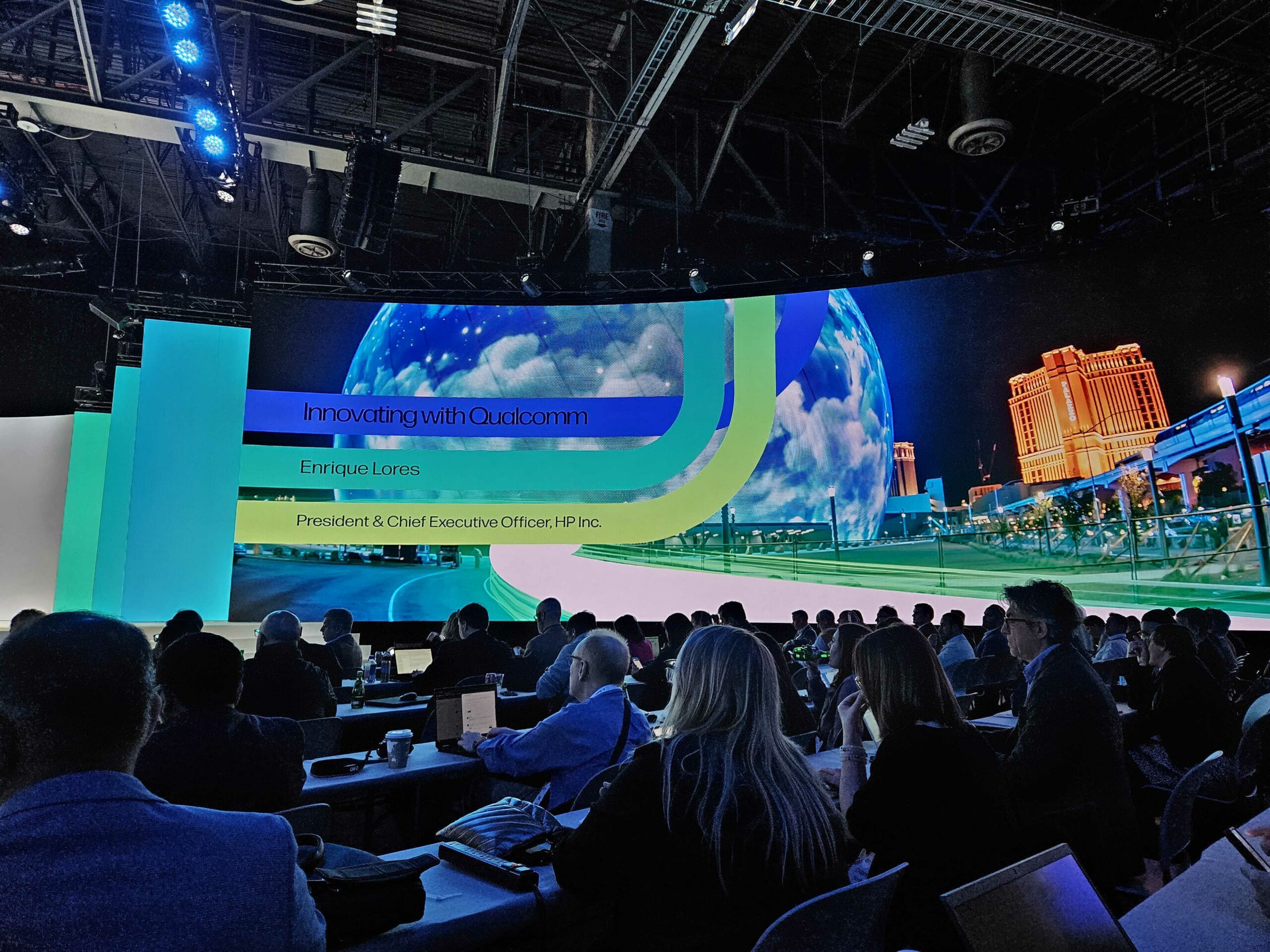Hardware
Nvidia CEO declares current
PCs obsolete
As HP unveils the largest lineup yet of artificial intelligence PCs, the world’s most powerful CEOs back its direction, writes ARTHUR GOLDSTUCK.
Computer and printer giant HP Inc this month unveiled the industry’s largest range yet of personal computers designed for artificial intelligence (AI).
At the HP Amplify Partner Conference in Las Vegas, the company ranked number 2 in the world in PC sales, unveiled 18 new models of notebooks, desktop PCs and workstations in a new segment called the “AI PC”. It is not the first with such computers, with the number 1 PC company, Lenovo, last month lifting the lid on a series of its own AI PCs, but the scope of the HP event was unprecedented in AI.

HP CEO Enrique Lores opens Amplify Partner Conference in Las Vegas. Pic: Arthur Goldstuck.
Aside from the formidable size of HP’s new range, it also lined up a who’s who of the world’s top chief executives in the tech sector to endorse its strategy, and explain the roles they would play in this roll-out. Most significantly, HP CEO Enrique Lores was joined on stage by Jensen Huang, founder and CEO of Nvidia, which this month became the world’s third most valuable company as it reached a $2-trillion market capitalisation.
Huang is regarded as the superstar of the industry for leading his company to a dominant position in the supply of computer chips that are optimised for AI applications. He declared that the industry was preparing to throw out all current PCs, which had been rendered obsolete by AI. By implication, he suggested a coming boom in AI PC sales.

Nvidia CEO Jensen Huang addresses HP Amplify Partner Conference in Las Vegas. Pic: Arthur Goldstuck.
“Creators, designers, data scientists, people who are in the tools creation and content creation business, your work is going to revolutionised by the new workstations,” said Huang. “ You have to recognise that we’ve reinvented the computer for the first time in 30 years. Which means that 30 years’ worth of computers are obsolete.
“It’s not an exaggeration. I know it sounds funny and it sounds like an incredible opportunity, but the fact is, it’s true. Obviously the new computers, the type of software they run, the way they’re going to run it, and the type of application they’re going to create, they’re going to be completely different. So it is sensible that the previous generation of computers was less fit for large language models. And so this is a great renaissance of the personal computer.”
Huang gave an example of a key industry about to be upended, with massive resultant spending on equipment.
“There’s a trillion dollars worth of data centres built in the world today, and it’s been built over the course of the last 30 years. And they’re obsolete. And notice how quickly Nvidia is growing into this incredible opportunity to modernise data centres all over the world, for accelerated computing for generative AI. There’s a wave of opportunity coming at you, and the starting point is today.”

HP CEO Enrique Lores and Microsoft CEO Satya Nadelal in conversation at Amplify Partner Conference in Las Vegas. Pic: Arthur Goldstuck.
Satya Nadella, CEO of Microsoft and the man who has presided over the software company becoming the most valuable company in the world, with a market capitalisation of more than $3-trillion, addressed the conference via videoconference. His key message revolved around how Microsoft’s AI platform, Coilot, would be built into all the HP machines.
“I think of every AI PC as a Copilot PC,” said Nadella. “The fundamental vision behind the PC was to be able to put the person on the centre and give them more agency. And that’s what the design is of the Copilot, which is how do you have people create faster, better.
“Bill (Gates) gave this speech at Comdex in 1993 where he talked about information at your fingertips. We’re at this new age where it’s about expertise at your fingertips. So the AI PC and these Copilot PCs is how you can get to all the expertise in the world when you need it, you can summon it.
“Some of these new PCS with AI built in are going to be pretty transformative in bringing this age of Copilots to everybody.”
Nadella told Lores that, between HP and Microsoft, the two companies would innovate at a rate where they would diffuse all the new technology broadly. He warned, however, that it was necessary to do all this responsibly.
“We’re not only talking about all the benefits the new technology can bring, but we’re also talking about the unintended consequences.”
In this context, Business Times asked Lores after the event how HP would balance the energy-intensive demands of AI processing with a commitment it had made to sustainability.
He replied that, the fact that the new PCs allowed AI to run on the machine rather than in the cloud, made it a more sustainable model.
“We don’t have to waste energy transferring data from one site to another. It will also run faster locally. So from an energy perspective, it is actually a more sustainable technology.
“AI in general and some of the generative AI ways of calculation is so much more efficient than the traditional computational models. So from a consumption perspective, those are relevant from an energy perspective.”
Lores told Business Times: “When we think about sustainability, we look at it from an all-round perspective. It’s not only about energy consumption, it’s about what materials we use, it’s about how we design our products, and it’s also about how we are thinking about our business models.”
The clear message of the event was that the HP business model and product line-up is likely to set the tone for the world’s PC makers’ response for the rest of 2024.

















